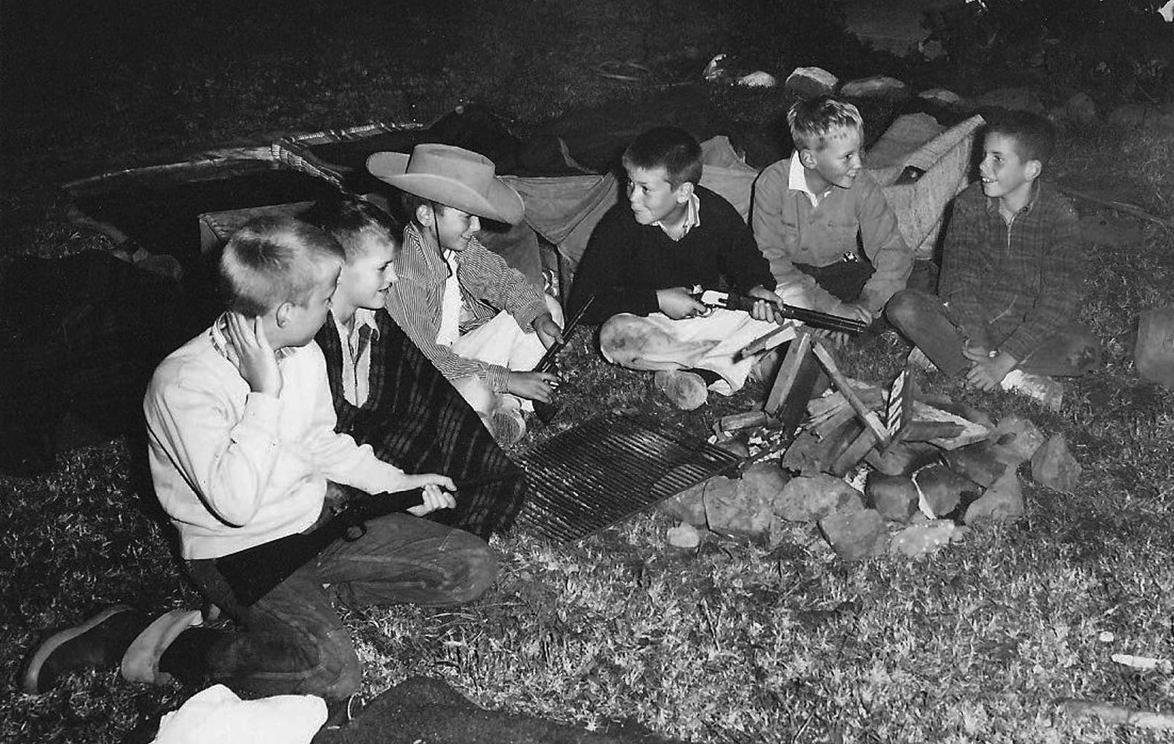
That's me, at left, listening to campfire stories long ago.
"Was your grandmother a lesbian?" I asked.
I was responding to a student's question about whether or not she could make a video for the class project (profile someone with an interesting story) about her grandmother who had migrated to the U.S. from Sicily.
"No, she wasn't."
"Mine was." I said.
The rest of the class leaned forward in their seats, all ears. Their response to the word "lesbian" had been huge compared to "Sicily." They were putty in my hands and wanted more.
The point wasn't to share personal information about my family (although my grandmother, who also migrated here (Norway), was awesome), but it was the only grandmother story I could think of at the spur of the moment that dramatized the point that grandmothers migrating here was a pretty commonplace story, one few would find interesting. Or was I wrong?
A judge once told me that, as a lawyer, he had two goals in the courtroom: to educate the jury and then persuade them to choose his side of the argument. Most stories are told with the same goal, to educate and persuade: we tell prospective employers about our history, our customers about our products, our local communities about people in need and our friends about our experiences.
So, if everyone can tell a story, what's the big deal? Well, we can all sing, too, but have you every heard your buddies on karaoke night at your local bar? Ouch!
Good storytelling is a craft, and we seldom have a captive jury for an audience, so we need to attract one and hang onto it.
SO HOW DO YOU TELL A GOOD STORY?
Consider these three elements when thinking about telling your story:
FIRST, IS IT THE RIGHT STORY?
Hmmm... which story is best: came over from Sicily, or lesbian? The important thing is that you consider what is relevant to your audience and, truth be told, a nomadic sojourn to America might be the just the right story to tell your sons and daughters of Sicily audience.
This applies to any audience. The story a war veteran delivers to a room full of vets would be a whole lot different from the one she'd give to her daughter's fifth grade class (You HAVE to read this joke!). But the good news is that in this age of new media you can get all of your messages out to the relevant audience.
Is a résumé a story? You bet it is, one of the most important we tell, but most are written like this:
Food server at a family restaurant:•Seated customers•Brought them food•Cashed them out
ZZZzzzz. Again, consider what's relevant to your audience (a potential employer). There's a missed opportunity here. Instead of stating the obvious, describe what you learned from the experience that might apply to the employer's needs. Offer a narrative instead of bullet points. How about:"The bustling and chaotic atmosphere I experienced as a food server at a busy family restaurant enabled me to hone my interpersonal communication and multitasking skills."
Better story. You're hired.
SECOND, IS IT A GOOD STORY?
So, let's think about the 'nomadic grandmother story' that my student suggested.
"My grammy boarded a ship in Oslo, sailed across the Atlantic and got off in New York to begin her new, exciting life."
ZZZzzzz again. Right? Kill me now. But suppose this is the right message you want your audience to receive? Well, you have to make it compelling. If you do that, you can still sneak in the important message while retaining your audience's attention, and you do this by focusing on a really cool sub story that's more captivating, one that makes us feel a visceral connection to Grammy:
"As she embraced her aging father on the dock they both knew they would never see each other again. In tears, she forced herself up the ocean liner's long ramp to begin her new, exciting life."
Gotcha! I call this the old M&M treatment, the micro to the macro. Suck them in with a smaller, intimate story and once you have them under your magic spell you hit them with the bigger message. So, if you want people to donate to your charity, don't just ask for money, first tell them a story about one needy child who benefited from it.
THIRD: TELL THE STORY WELL
When you were a kid, did you ever hear a story around a campfire that was so vivid, so colorfully told that everyone and everything around you vanished, blasted out of your consciousness by the force of the narrative? This is what we live for and makes storytelling more powerful than Godzilla. To do it successfully you need to have a command of four critical communication literacies, which I'll go into detail about in my next blog piece.